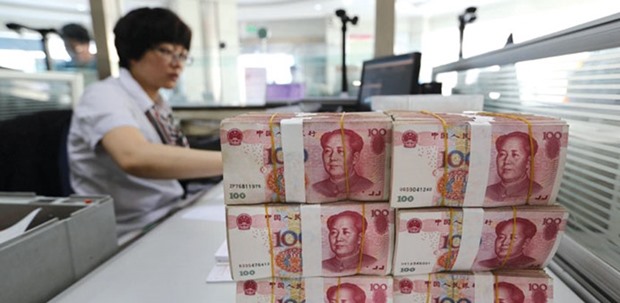Yield versus yuan. That’s the crux of the investment decision now facing the global funds given more access to China’s bond market. While it offers the highest yields among the world’s major economies, Pacific Investment Management Co (Pimco) and Schroder Investment Management say exchange-rate risk is damping global demand for Chinese assets. Barclays said last week there’s a growing chance China will announce a sharp, one-time devaluation to change sentiment toward the currency and suggested such a move would need to be in the region of 25% to be effective.
“Uncertainty around currency policy remains one of the larger hurdles for foreign investors,” said Rajeev De Mello, who oversees about $10bn as head of Asian fixed income at Schroder Investment Management in Singapore. “This should be resolved as the year progresses and would then be a signal to increase investments in Chinese government bonds.”
The People’s Bank of China said last week that most types of overseas financial institutions will no longer require approvals or quotas to invest in the 35tn yuan ($5.4tn) interbank bond market, which had foreign ownership of less than 2% at the end of January.
The nation’s 10-year sovereign yield of 2.87% compares with 1.74% in the US, which offers the highest rate among Group of 10 countries, and sub-zero in Japan and Switzerland.
The yuan has weakened 5% versus the dollar since a surprise devaluation in August, even as the central bank burnt through more than $400bn of the nation’s foreign-exchange reserves over the last six months trying to support the exchange rate amid record capital outflows.
China is opening its capital markets to foreign investors to try and draw money as the slowest economic growth in a quarter century drives funds abroad, pressuring the yuan. Freer access will help the nation’s bonds gain entry to global benchmarks, bolstering appetite for the securities as a restructuring of local-government debt spurs record issuance.
Uncertainty on the currency is preventing investors from buying onshore assets now, according to Luke Spajic, an emerging markets money manager at Pimco, whose developing-nation currency fund has outperformed 82% of peers during the past five years.
“If you buy these bonds, collect coupons, make some profits, how can you take the money out, are there any issues.” Spajic said in an interview in Shanghai on Thursday. “What we want to clarify is how this process works now, given the capital control environment.”
The central bank said foreign commercial lenders, insurance companies, securities firms and asset managers will all be allowed to access China’s interbank bond market, and that it hopes to attract long-term investors such as pension funds and charities. Hedge funds were not included, while foreign central banks and sovereign wealth funds gained access in June.
“It’s a step in the right direction but inflows are not imminent,” said Jens Nystedt, the New York-based managing director at Morgan Stanley Investment Management, which oversees $406bn. “There are a lot of other questions that need to be answered first. One of those is the clarity on their exchange-rate policy.”
Global funds could be drawn to Chinese bonds because their exposure geographically should have some correlation with gross domestic product, said Kenneth Koo, Shanghai-based deputy general manager at Citi Orient Securities Co.
The temporary problem is that people are not sure what China is going to do with the yuan, and when that settles, the force will come in, he added.
“What came out yesterday was much, much more than anticipated,” said Pimco’s Spajic. “We were very encouraged. Of course we have a lot of questions in terms of how this works in practice, but clearly being an active bond manager, we are very interested to find how we can participate, what we can do.”
The level of interest may initially be fairly muted as foreign investors assess how easily they can repatriate funds from China’s bond market, and whether the rules will change, said Ryan Lam, Hong Kong-based head of research at Shanghai Commercial Bank.
“I don’t think it will change capital flows in a big way,” he said. “The key concern for the foreign investor is whether they can liquidate their positions. While China welcomes inflows, they don’t equally welcome outflows and so there’s a risk of them imposing requirements further down the line that make it difficult to liquidate.”

Yuan banknotes are placed on a staff’s table in a bank in China. The yuan has weakened 5% versus the dollar since a surprise devaluation in August, even as the central bank burnt through more than $400bn of the nation’s foreign-exchange reserves over the last six months trying to support the exchange rate amid record capital outflows.
